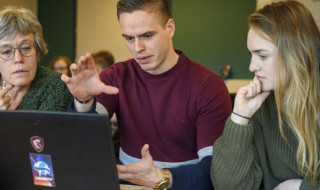How can you maintain online contact between teacher and student and improve the quality of education? Online tutoring offers more flexibility and a mix of tutoring formats, making education more interesting for student and teacher. Read real-life stories to use online tutoring in teaching practice.
Inspiring examples
In the Incentive Scheme for Open and Online Education, there are several projects with a focus on online tutoring. Get inspiration here and take advantage of the project results that are openly available.
Online tutoring in the virtual classroom
Interdisciplinary and international collaboration
Within this project, the interdisciplinary and international blended undergraduate course The imprinted brain was designed, implemented and evaluated. Students in this course explore the molecular genetics of mental disorders and must work together to complete an assignment. An online tutoring structure was developed for heterogeneous student groups working together on interdisciplinary topics. In doing so, students receive online guidance from both the instructor (feedback) and fellow students (peer learning). A clear structure provides them with guidance and two different collaboration platforms: one for synchronous and one for asynchronous collaboration are suitable for communication and interaction. In the follow-up project, the project leader wants to investigate the effect of a clearer division of roles and project leader per group of students.
Collaborative learning in the virtual classroom
The project Begeleiden in Synchroon Online oNderwijs (BISON) focuses on collaborative learning in the virtual classroom. Different scenarios for online collaborative learning have been developed and evaluated. The result is an electronic handbook with guidelines, instructions and examples for designing, developing and providing collaborative learning in the virtual classroom. In addition, resentment workshops for teachers are offered.

Online tutoring within an online learning environment
Online writer's workshop with feedback teams
In the online writer's workshop, law students come together to improve their writing skills in reciprocity. The goal is for students to gain greater knowledge, understanding, skill and confidence in writing as professionals at the academic level. Students work with uniform and standardized assessment criteria for writing assignments. Each criterion is explained with a short video clip (knowledge clip), a self-test and good examples to further develop the skills themselves. Students can then submit their drafts for feedback and provide others with feedback.
Online learning environment for collaboration
Within the online learning environment Atelier, student assistants from the CreaTE program (the undergraduate CreativeTechnology program) are supported to provide better feedback during a tutorial. Because the questions can be very broad, the support by student assistants is feedback-intensive. In the online learning environment, students can more easily share their work, interact with others and receive feedback. In addition, the online learning environment contributes to discussions about common errors and poor software design that can be noticed through static analysis. Teachers can focus on the most difficult questions and provide feedback to students within the online learning environment.

Online guidance during internship
Enrich workplace learning through online guidance and reflection
The Internship App was developed with students as an educational project to enrich workplace learning. Through the Internship App, students are encouraged to reflect online on their workplace learning experiences. This gives trainees more control over the supervision process during their internship. By shaping this process online there is a lot to gain in terms of the quality of the guidance and the learning effect for the student. The source code of the app is available through an open source license, making it usable by other institutions as well.
Developing into a critically reflective professional
In order for students to further develop into critically reflective professionals during the internship, it is necessary that all involved know how best to guide the student in critical reflection. To this end, an online learning environment was developed within Teams to allow trainees, practice supervisors and supervisors to work together. In this digital learning environment, materials are available for students to practice critical reflection, giving and receiving feedback. All parties can also collaborate within this environment to increase the student's level of reflection. Students learn to reflect according to the Rubric for Narrative Reflection Assessment (NARRA) with the goal of achieving the critical reflection level (level 4 of NARRA).

Online mentoring for field practica
Remote feedback via livestreaming
This project investigated whether livestreaming allows teachers to give more efficient and targeted feedback remotely during field practica. Good and efficient feedback is important in field practica where theoretical knowledge is tested against practice. Due to the increasing number of students, it is becoming increasingly challenging to organize this and therefore other possibilities were explored in this project. Students could use their smartphone or tablet to ask advice from the field to the instructor during a field practicum, while the instructor could ask the student additional questions.
Studying more autonomously with just-in-time knowledge
Within this project, Utrecht Computer Science students in co-creation with Earth Sciences students developed an app to allow students to work more autonomously during fieldwork. The app The Utrecht Companion to the Earth offers specific and location-dependent content that enables problem-based and student-centered learning. The app includes materials such as instructions, knowledge clips and infographics. As a result, students gain just-in-time knowledge and practical skills during fieldwork.
Lots of practice and online tutoring
Automating part of the tutoring process during practica
The Labrador tool helps instructors and student assistants develop skills that students can normally only practice during practicums or labs. Labrador's chatbot and automatic reviewer automate part of the tutoring process. This came about because the huge growth in student numbers called for a more efficient way of providing feedback. The tool allows more efficient and effective use of contact time with teachers and student assistants.
